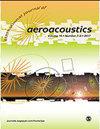A study on an integrated aero-vibro-acoustic analysis procedure for a small-scale supersonic jet and surrounding thin plates
IF 1.2
4区 工程技术
Q3 ACOUSTICS
引用次数: 0
Abstract
The goal of this paper is to examine the computational approaches for predicting both of the overall sound pressure level (OASPL) at a few locations and acceleration power spectral density (APSD) of surrounding thin plates due to the aero-acoustic pressure generated by a cold jet with M = 1.8. First, computational fluid dynamics (CFD), particularly delayed detached eddy simulation, are applied to predict the OASPL at the near-field and compute the acoustic properties. Second, the linearized boundary element method (BEM), that is, the Helmholtz-Kirchhoff method is utilized to propagate the pressure and obtain the OASPL at the far-field. Finally, the finite element method is implemented to predict the APSD for a clamped thin plate based on the optimal triangle membrane element, discrete Kirchhoff triangle plate bending element, and Newmark-β time integration scheme. Using the present CFD and BEM, the OASPLs are compared with the experimental results measured by microphones at both the near- and far-fields, respectively. Moreover, APSDs are compared with the experimental results obtained by an accelerometer at a few different locations. Although OASPLs are overestimated because of the coarse meshes in the higher-angle area and low order scheme of the present CFD analysis, the present integrated aero-vibro-acoustic analysis is capable of predicting the OASPL and APSD generated by a cold jet with M = 1.8.小型超音速喷气发动机及其周围薄板的气动声振综合分析方法研究
本文的目的是研究在M = 1.8的冷射流产生的气动声压作用下,几种位置的总声压级(OASPL)和周围薄板的加速度功率谱密度(APSD)的计算方法。首先,应用计算流体力学(CFD),特别是延迟分离涡模拟,对近场声场声场进行预测,计算声场声场特性;其次,利用线性化边界元法(BEM),即Helmholtz-Kirchhoff方法对压力进行传播,得到远场的OASPL;最后,采用基于最优三角膜单元、离散Kirchhoff三角板弯曲单元和Newmark-β时间积分格式的有限元方法对夹紧薄板的APSD进行了预测。利用CFD和边界元,分别在近场和远场与传声器测量的实验结果进行了比较。并与加速度计在不同位置的实验结果进行了比较。虽然由于目前CFD分析的高角区域网格较粗,且格式较低,导致了对OASPL的过高估计,但目前的气动振声综合分析能够预测M = 1.8的冷射流产生的OASPL和APSD。
本文章由计算机程序翻译,如有差异,请以英文原文为准。
求助全文
约1分钟内获得全文
求助全文
来源期刊

International Journal of Aeroacoustics
ACOUSTICS-ENGINEERING, AEROSPACE
CiteScore
2.10
自引率
10.00%
发文量
38
审稿时长
>12 weeks
期刊介绍:
International Journal of Aeroacoustics is a peer-reviewed journal publishing developments in all areas of fundamental and applied aeroacoustics. Fundamental topics include advances in understanding aeroacoustics phenomena; applied topics include all aspects of civil and military aircraft, automobile and high speed train aeroacoustics, and the impact of acoustics on structures. As well as original contributions, state of the art reviews and surveys will be published.
Subtopics include, among others, jet mixing noise; screech tones; broadband shock associated noise and methods for suppression; the near-ground acoustic environment of Short Take-Off and Vertical Landing (STOVL) aircraft; weapons bay aeroacoustics, cavity acoustics, closed-loop feedback control of aeroacoustic phenomena; computational aeroacoustics including high fidelity numerical simulations, and analytical acoustics.
 求助内容:
求助内容: 应助结果提醒方式:
应助结果提醒方式:


